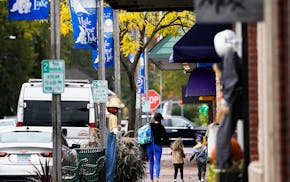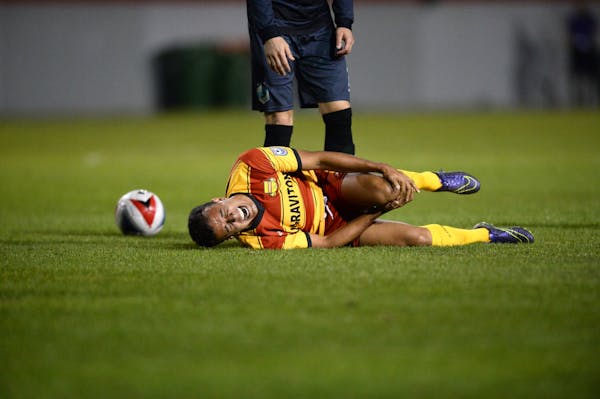Metropolitan Stadium stood for 28 years. The St. Paul Civic Center lasted 25. The Metrodome hung on until the old age of 31.
But the soccer stadium planned for Minnesota United — the newest addition to the state's growing list of professional sports arenas — is poised to beat them all.
St. Paul signed a 52-year lease with the Metropolitan Council for a property in the Snelling-Midway neighborhood where United owner Bill McGuire plans to build a stadium. McGuire agreed that the team will cover the $556,620 annual lease payment to the Met Council.
A half-century lease is rare — but not unique — in Major League Soccer. It appears United would be the third team to have a lease of that length. Such a long lease has some people, including state Sen. David Senjem, asking what happens if things go south for the team.
"What if the league folds, what if … the franchise isn't successful from the standpoint of attendance and can't sustain it?" Senjem asked at a Senate Taxes Committee meeting, where McGuire urged legislators to keep the Met Council property off the tax rolls.
"Were things to turn terrible — and looking at how some of the MLS teams have endured with far less enthusiastic audience, we're not counting on that — the first thing that would happen, I guess, is the ownership group would be out $250 million," McGuire responded. "So, we don't intend that to actually occur. And that's the reason for the long-term lease."
If McGuire's intentions do not bear out and the team breaks the lease, St. Paul would still control the land and would be responsible for the annual lease payment. It would also own the stadium.
The city could find another user for the stadium or redevelop the land, city spokeswoman Tonya Tennessen said. Or, she said, the city and Met Council could agree to cancel the lease and return the land to the council.
Around the league
Major League Soccer launched in 1996 with 10 teams. League attendance averaged just over 17,000 fans a game, with teams playing mostly in older stadiums that had been built for other sports. Twenty years later, the league has 20 teams, with plans to expand to 24 by 2018, and an average attendance of 21,000 per game. Fifteen teams now play in new or renovated soccer-specific stadiums.
The cost to build those stadiums has ranged from $31 million in Columbus, Ohio, in 1999, to $245 million for Red Bull Arena in Harrison, N.J., which opened in 2010.
Three teams — Columbus, Los Angeles and San Jose — built stadiums without public money. Another, Orlando, will open its new privately funded stadium in March 2017. The rest have been built with a mix of private and public dollars.
According to a May 2014 study commissioned by Washington, D.C., to examine building its own soccer-only stadium, 87 percent of soccer stadiums sit on public land, and about half are owned by public entities. Yet the soccer teams control the revenue at 87 percent of the stadiums.
The study also found that MLS leases range from 20 to 50 years, with Philadelphia and Salt Lake having 50-year leases. Montreal has a 40-year lease. Four other teams have 30-year leases. Rent varies. Philadelphia is making $500,000 annual payments for the first five years of its lease, with payments dropping to $150,000 after that. Salt Lake pays just $1 a year for its lease, but $1.2 million a year in property taxes.
Growing crowds and successful stadiums have sparked immense confidence in the sport's long-term prospects, team officials said. In Portland, the defending champion Timbers have a waiting list for season tickets. Sporting Kansas City averages more than 20,000 fans a game and has had 74 straight sellouts, said Rob Thomson, executive vice president of communication and digital.
"A 50-year lease doesn't seem crazy at all. In 20 years this league has grown so much," he said. "We are bullish on our goals for being one of the top leagues in the world."
So, too, is Phil Rawlins, president and founder of the Orlando City MLS club, which began play in 2015 at the nearby Citrus Bowl. After plans for a 19,000-seat, public-private stadium hit a snag with the state of Florida, Orlando's attendance of more than 30,000 fans per game prompted Rawlins to change the equation. The team bought the land and is building the 26,000-seat stadium.
"I don't think there's a better bet in sports ownership today than soccer," Rawlins said. "The game is not going to go anywhere and the league is going to get stronger."
Future maintenance
Minnesota United could make its major league debut as early as spring 2017, although that would mean starting play in another venue.
But United's entry into MLS is contingent on the team getting a stadium. McGuire has said the stadium deal could fall apart if the Legislature does not continue to grant a property tax exemption. The team is also seeking a tax break on construction materials and a liquor license for the stadium.
If the pieces fall into place, the stadium with about 20,000 seats would open in 2018. Once built, ownership of the building would be turned over to St. Paul. But the city would not have to pay for its upkeep.
"We will be responsible for any ongoing maintenance and improvements, not the city," McGuire said at the Senate Tax Committee hearing.
In addition to maintenance, the team agreed to develop a capital improvement plan to "guide the future capital needs" of the stadium and the plaza, parking areas and other spaces by the stadium, according to the agreement between the city and the team.
St. Paul City Council Member Jane Prince voted against the stadium deal, in part because she wanted an independent consultant to look through the paperwork for any issues the city might have missed. The majority of the council did not agree.
"Hopefully it was written in a way that we would not have the same thing happen to us that Minneapolis did with Target Center," Prince said. Minneapolis is paying $74.5 million to overhaul the city-owned building where the Timberwolves play.
"The good news if it doesn't work is we have site control, we haven't had to pay for the stadium," Prince said. "If soccer weren't to be the sport that we hope it is in 20 or 30 years, we have the option of looking at other uses. But I hope there's nothing that we didn't notice in the agreement."
The stadium is an enormous risk, said Senjem, who is co-sponsoring the Senate bill that would grant the team tax breaks, but he said McGuire and the team — not taxpayers — are responsible.
"It's a very costly upfront investment that is going to be paid off in what seems like a very, very long-term way," Senjem said.
Jessie Van Berkel • 612-673-4649
James Walsh • 651-925-5041

Shop the curbs for free on 'Trash to Treasure Day' in White Bear Lake
Longtime Uptown boutique closing in May

Meet the Athena Award winners: 103 female athletes honored by their schools

Lacrosse lists: 21 top players and the school that's No. 1 for boys and girls

